Ata-ul-Haye Nasir, Al Hakam
Members of the Ahmadiyya Muslim Jamaat, across the world, have great love and make endless sacrifices for their respective countries. In the same vein, Ahmadis of Pakistan have been at the forefront of contributing towards the establishment, stability, integrity and development of their homeland – a history that is often veiled by anti-Ahmadi proponents.
Sadly, despite their immense sacrifices and services for Pakistan, Ahmadis are labelled as “traitors” and “enemies of the country”, a narrative perpetuated by Muslim clerics. Additionally, opponents of Jamaat-e-Ahmadiyya demand to remove Ahmadis from important positions, such as in the army, judiciary, civil service etc.
During his recent Friday Sermon (9 July 2021), Hazrat Khalifatul Masih Vaa said:
“Under the Islamic government, non-Muslims were granted senior positions. It was not the case that only Muslims were given key posts; in fact, non-Muslims and non-Arabs also held key positions. Hazrat Musleh-e-Maudra stated:
“‘During the time of the Holy Prophet’ssa caliphs, though all nations had not yet peacefully settled in the country [under Islamic rule], they were still granted their rights. Hence, mentioning this, Allama Shibli states:
“‘“When Hazrat Umarra expanded the department of military, there was no distinction between any nation or community, so much so that there was no religious or communal bias.” (Al-Farooq, Part 2, Under the topic Sigha-e-Foj, p. 251)’ (Tafsir-e-Kabir [2023], Vol. 9, p. 154)”
Hazrat Khalifatul Masih Vaa continued:
“Today, in Pakistan, they say that Ahmadis should be removed from the army as it is a sensitive position, whereas if one studies history, Ahmadi army officers have offered the most sacrifices for Pakistan. Nonetheless, these are their own schemes.”
History bears witness that Ahmadis of Pakistan have always rendered great services for protecting their homeland.
In this article, I wish to present a brief introduction to some of the Ahmadis who served at the higher positions in the Pakistan Armed Forces and rendered great services.
Lieutenant-General Akhtar Hussain Malik Sahib
Lieutenant-General Akhtar Hussain Malik Sahib was born in Jalandhar, British India. During the World War II, he joined the British Indian Army as a sepoy. His capabilities were soon noticed by the higher in-command, and he was sent to the Indian Military Academy in Dehradun for training and further military education. He continued to progress and subsequently was promoted to the rank of captain on 1 April 1942.
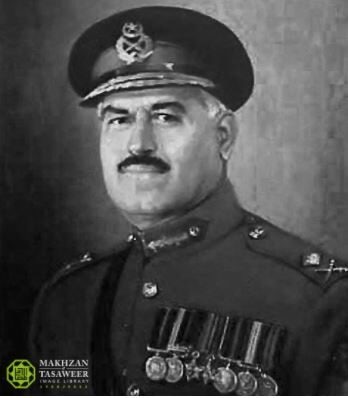
After the partition of the Indian subcontinent, Akhtar Hussain Malik Sahib’s regiment was allocated to the newly-created Pakistani Army. He opted for Pakistani citizenship, and continued his military service with the Pakistani Army.
Lieutenant-General Akhtar Hussain Malik – an Ahmadi – planned “Operation Gibraltar” and “Operation Grand Slam” under the auspices of then President of Pakistan, Field Marshal Ayub Khan. As GOC for the 12th Infantry Division, Lieutenant-General Akhtar Hussain Malik Sahib was the overall commander for Operation Grand Slam in the 1965 war.
Agha Shorish Kashmiri, a leader of the Majlis Ahrar-e-Islam wrote a poem during those days and said:
دہلی کی سرزمیں نے پکارا ہے ساتھیو
اختر ملک کا ہاتھ بٹاتے ہوئے چلو
Meaning, “The land of Delhi has challenged us; let us move forward by assisting Akhtar Malik.” (Haft-Roza Chattan, 13 September 1965)
While this operation was still in progress and was achieving great success, the reins of command were handed over to General Yahya Khan, resulting in extensive delays and eventual failure of the operation.
The weekly Al-Fath of Karachi, of 13-20 February 1976, wrote:
“In Chamb Sector, Yahya Khan’s division was deployed. As soon the war began, the command of this division was given to General Akhtar Hussain Malik, who defeated the enemy with immense wisdom, highly specialised capabilities and bravery, and moved towards the [Indian] Occupied Kashmir.
“Upon this, Yahya Khan said to Ayub Khan, ‘I will command my division myself, Akhtar Malik should be removed from there.’ Ayub Khan accepted Yahya Khan’s demand and Yahya Khan was given the command. After that, the Pakistani Army’s progress in that sector stopped. Army specialists say that if the command had remained with Akhtar Malik, Kashmir would have been conquered.”
In this regard, Qudrat Ullah Shahab, an eminent Urdu writer and civil servant, said:
“When General Akhtar Malik started implementing his plan, and had nearly conquered Akhnoor, many generals including General Musa became concerned that if the campaign of General Akhtar Malik succeeded, he would emerge as an army hero. Many army and non-army officials, including President Ayub, did not want Major General Akhtar Malik to emerge as a hero of this war and a deserving [candidate] for the position of next commander-in-chief. Due to the fact that President Ayub had already mentally saved this position for General Yahya Khan, therefore exactly at a time when Major General Akhtar Hussain Malik was proceeding swiftly at the Chamb-Akhnoor Sector, he was removed from the command immediately and General Yahya Khan was put in his position. Perhaps the aim was to prevent the Pakistani Army from conquering Akhnoor. He [Yahya Khan] accomplished this task ‘very successfully’”. (Shahabnama, p. 635)
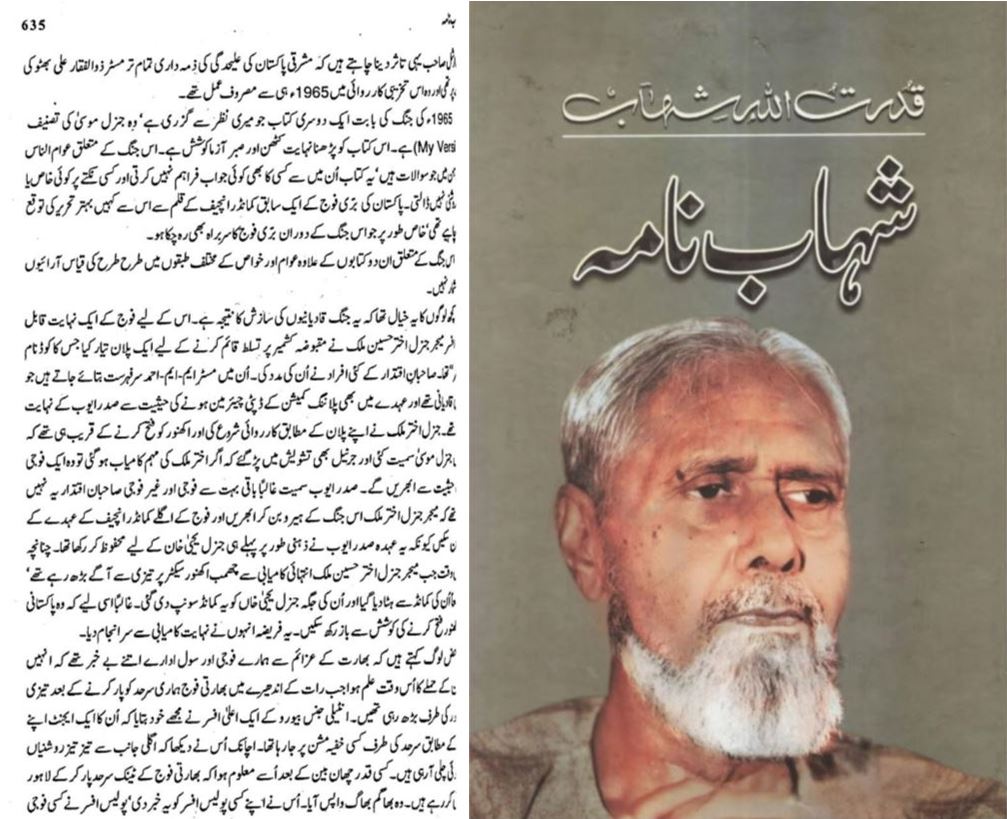
The former Security Superintendent of Rawalpindi Jail, Colonel Rafiuddin has recorded his memoirs about Zulfikar Ali Bhutto, in a book titled, Bhutto ke Aakhri 323 Din. He stated that one day, they had a discussion about the 1965 war, and Zulfikar Ali Bhutto said:
“If General Akhtar Malik’s advance at the Chamb-Jaurian front of Kashmir had not been halted, he would have decimated the Indian army in Kashmir. However, Ayub Khan wanted his favourite General Yahya Khan to emerge as the hero.” (Bhutto ke Aakhri 323 Din, p. 66)
Colonel Rafiuddin states that during this discussion, Zulfikar Ali Bhutto highly praised General Akhtar Malik, and said:
“Akhtar Malik was a General of exceptional genius. He was a great commander, a man of courage and guts who understood the art of military strategy. A General of his calibre has never been produced by the Pakistani Army.” (Ibid)
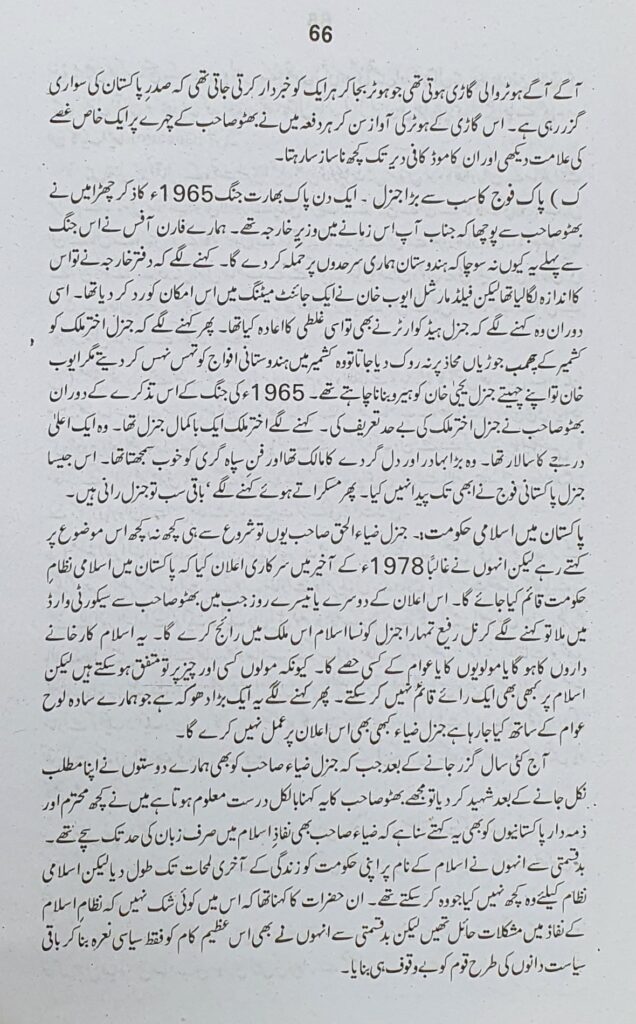
These remarks were also published in The Nation on 5 December 1991.
Mumtaz Hussain Shah Advocate has also mentioned this incident in his book, Aamriyyat Ke Saaye (p. 88). At the end, he writes:
“General Akhtar Malik was removed from the Chamb-Jaurian sector, merely because he belonged to the Qadiani Jamaat, and the generals of Pakistani Army did not want a Qadiani General to get the credit for such a great success.”
A detailed and informative article of Brigadier (retired) Shaukat Qadir, was published in the Daily Times of Lahore on 4 October 2003 in which he outlined details of Operation Grand Slam 1965. He stated that Lieutenant-General Akhtar Hussain Malik was a brave and courageous commander, who would never get frightened even in highly pressured situations, and would keep calm and instil confidence in his colleagues, officers and soldiers alike.
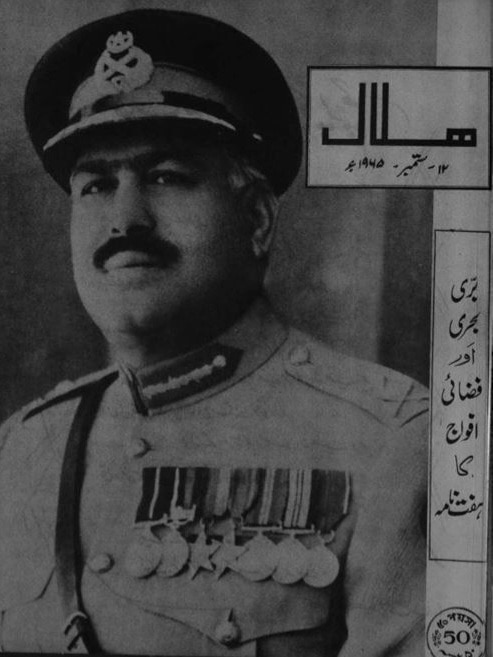
For his successful handling of the initial phase of the operation at the Chamb-Jaurian area in [Indian] Occupied Kashmir, Lieutenant-General Akhtar Hussain Malik was awarded the Hilal-e-Jurrat (Crescent of Courage), the second highest gallantry award of Pakistan’s Army.
The Monthly Hilal (Urdu), a magazine of the Pakistan Armed Forces, published articles about him in its 12 September and 3 October 1965 issues, along with photographs.
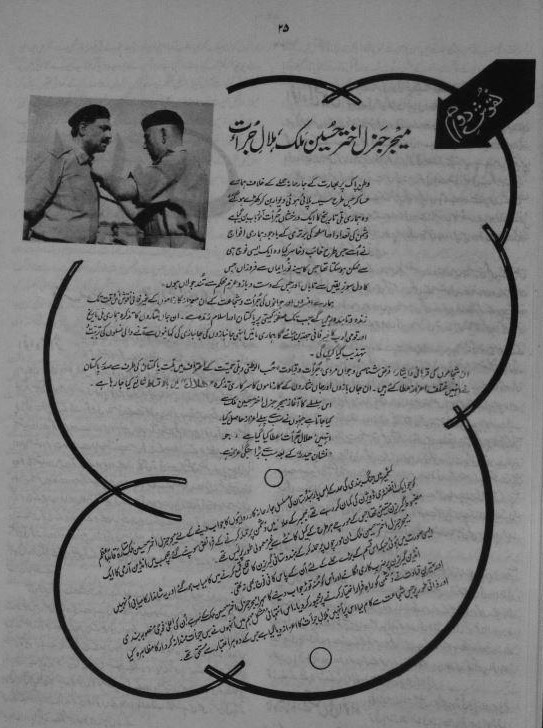
After the war, Lieutenant-General Akhtar Hussain Malik was posted to an advisory commanding position for CENTO in Ankara, Turkey, where he passed away in a road accident on 22 August 1969. He was buried in Rabwah, Pakistan.
Dr Shabbir Ahmad of America, in his article published in Nawa-e-Waqt Sunday Magazine, said:
“It is said that when General Akhtar Malik got injured in a dangerous accident in Turkey, he had two words on his tongue during his last moments, ‘Akhnoor, Kashmir’”. (Nawa-e-Waqt Sunday Magazine, 12 June 2005, p. 10)
Ahmad Nadim Qasmi, a prominent journalist, poet and literary critic, said:
“Lieutenant-General Akhtar Hussain Malik was such a hero of the country and nation, whose name is even known to the Pakistani children.” (Daily Jang of Karachi, 4 September 1969)
Lieutenant-General Abdul Ali Malik Sahib
Another Ahmadi, Lieutenant-General Abdul Ali Malik Sahib served Pakistan’s Army. He was born in Jalandhar, and was the brother of Lieutenant-General Akhtar Hussain Malik Sahib.
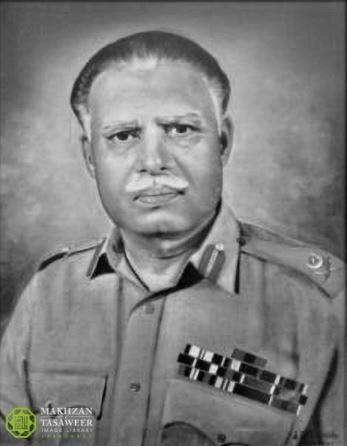
Lieutenant-General Abdul Ali Malik Sahib joined the Pakistani Army as a cadet-officer and was later posted in the Army Corps of Engineers. He completed his BSc in electrical engineering from the Pakistan Military Academy and served in the civil projects of the Pakistani Army.
Abdul Ali Malik Sahib earned distinction for leading the combat engineering formations to mechanised warfare in Chawinda during the 1965 war with India.
He was commander of the 24th infantry brigade in the Sialkot-Phillurah-Chamb sector. It was this place, where the second largest tank battle in history was fought after the Battle of Kursk in World War II.
In this regard, the Daily Amroz wrote:
“The Force Commander, Brigadier Abdul Ali Malik did not allow the opponent army to succeed in its intentions, despite having more power with respect to weapons and manpower […] The bravery, courage and wisdom of Brigadier Abdul Ali Malik did not let the enemy succeed in its plans […] Brigadier Abdul Ali Malik was awarded with Hilal-e-Jurrat [Crescent of Courage] for his great services.” (Daily Amroz, 25 September 1965)
Nawa-e-waqt reported on 25 September 1965 that the Commander-in-Chief, General Muhammad Musa distributed awards among the officers and soldiers. It further wrote:
“The most interesting and breathtaking moment was when two brothers were awarded with Hilal-e-Jurrat. These two brothers are Major General Akhtar Hussain Malik and Brigadier Abdul Ali Malik, who have been awarded with Hilal-e-Jurrat for rendering great services during the current war [of 1965].”
When Abdul Ali Malik Sahib was promoted as a Major General, he commanded the 8th Infantry Division in the western sector of the 1971 Indo-Pakistan War. He retired from the Army after commanding the I Corps at Mangla.
Air Marshal Zafar Ahmad Chaudhry Sahib
Air Marshal Zafar Ahmad Chaudhry Sahib was another Ahmadi who served as the first Chief of Air Staff of Pakistan’s Air Force, appointed in 1972 and served until 1974.
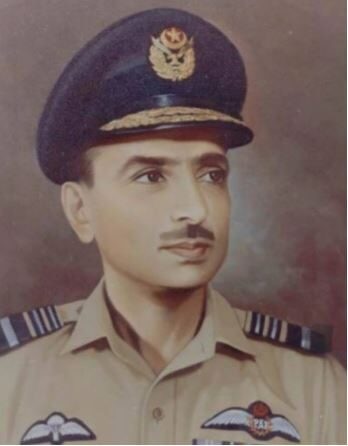
Zafar Ahmad Chaudhry Sahib graduated from Punjab University, Lahore in 1944 and then joined the Royal Indian Air Force.
Following the partition of the Indian subcontinent, Zafar Ahmad Chaudhry Sahib joined the Pakistan Air Force and qualified as an instructor on the North American T-6G Harvard. He pursued further education at the RAF Staff College in Hampshire, England before attending the Joint Service Defence College of the British Army. Before returning to Pakistan, he obtained qualification from the Imperial Defence College. (Hayes, Grace P & Martell, Paul, World Defence Who’s Who, p. 38 [1974])
In 1965, Zafar Ahmad Chaudhry Sahib served in the Air Headquarters as a Director Air Operations, taking responsibility for planning combat aerial operations during the second war with India.
In 1969, he was appointed as Station Commander of the Pakistan Air Force Station Sargodha. In 1971, he was appointed as managing director of Pakistan International Airlines, which he directed until 1972.
On 3 April 1972, Zafar Ahmad Chaudhry Sahib was appointed as the first Chief of Air Staff for the Pakistani Army and commanded Pakistan’s Air Force. He served as the Chief of Air Staff until his resignation in 1974. As Brian Cloughley puts it in his 2016 book, A History of the Pakistan Army: Wars and Insurrections (p. 212):
“He resigned, ‘In fairness to him’, says The Story of the Pakistan Air Force, ‘it must also be stated that his abrupt departure may have been precipitated by the anti-Qadiani sentiment sweeping the country at the time’. (Chaudhry was an Ahmadi). Things are not always what they seem.”
Major General Iftikhar Khan Janjua Sahib
Another Ahmadi, Major General Iftikhar Khan Janjua Sahib was one of the most senior Pakistani Army officers to have been martyred while in action. He is known in Pakistan as the hero of Rann of Kutch, as he was a brigadier in command of the 6 Brigade, during the fighting in April 1965 prior to the Indo-Pakistan War of 1965. He was awarded the Hilal-e-Jurrat (Crescent of Courage) for his bravery.
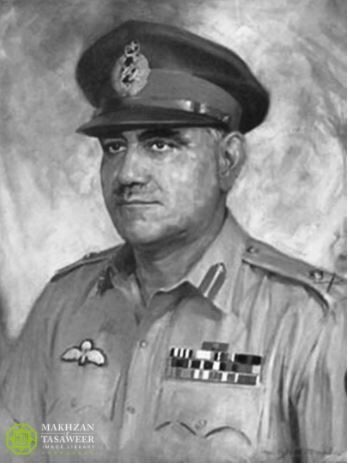
On 8-9 April 1965, clashes broke out between India and Pakistan at a post near Ding, Rann of Kutch. The outcome of the Rann of Kutch was considered as a positive result for Pakistan’s Army. As described by Lieutenant General Gul Hassan Khan, then Director of Military Operations, in his later memoirs:
“The set-back in Kutch proved immeasurably disconcerting to the Indian Army. As a result, the Government of India was in a quandary. On the other hand, ours was in a state of euphoria. The high command of our army was intoxicated by our showing and our morale could not possibly have been higher. We were ready for any task that may be assigned to us without any question.” (The Nation, 24 September 1999)
His role during the 1965 and 1971 wars has been described in an article, published on 6 September 1975, by the Weekly Hilal – a well-known magazine of the Pakistan Armed Forces. The article also included his photograph.
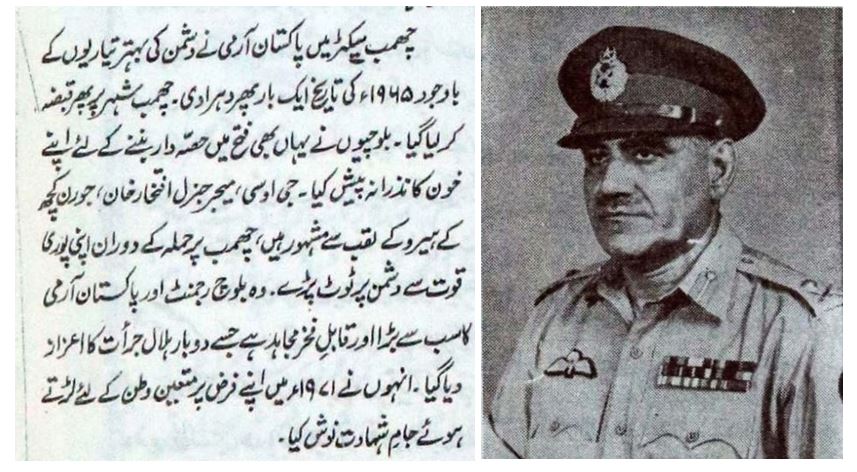
His role in the 1965 war has been described in another article of the said magazine, published in September 2010, narrating his role particularly in relation to the construction of the BRB Canal in Lahore which ultimately proved crucial during the 1965 war.
After the 1965 War, Iftikhar Janjua Sahib was the divisional commander of the 6 Armoured Division. Then, he commanded the 23 Division based at Jhelum.
In the 1971 War, Iftikhar Janjua Sahib was divisional commander of the 23 Infantry Division. He was assigned the task of capturing Chamb, a strategically important town in Kashmir, which would turn out to be the only decisive victory for Pakistan on the Kashmir front of 1971.
After intense fighting, Mandiawala was captured, then Pallanwala and Chak Pandit, and on 9 December 1971, the first Pakistani troops entered the surrounding area around Chamb under the personal supervision of Iftikhar Janjua Sahib. During the battle, on 9 December 1971, Major General Iftikhar Khan Janjua’s OH-13S (Sioux) light helicopter was attacked, in which he was travelling to coordinate and position his troops. His helicopter crashed and due to severe injuries, he was martyred on the next day.
Iftikhar Khan Janjua Road is named after him in Rawalpindi, Cantt.
Iftikhar Janjua Sahib was a charismatic leader who inspired his troops to continue to fight. Due to his great leading skills, he is remembered even today by the troops who served under his command, in the 23 Division during the Battle of Chamb.
Captain Nazeer Ahmad Sahib
Another Ahmadi, Captain Nazeer Ahmad Sahib served in the Pakistani Army. He joined the Pakistani Army in 1953. He got martyred at the Khem Karan front during the 1965 war. (Tarikh-e-Ahmadiyyat, Vol. 23, pp. 94-96)
Squadron Leader Khalifa Muniruddin Ahmad Sahib
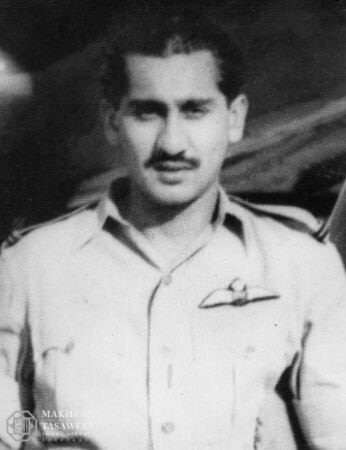
Squadron Leader Khalifa Muniruddin Ahmad Sahib, son of Hazrat Dr Khalifa Rashiduddinra, served in the Pakistan Air Force. In 1949, he got admission in Flying Club Lahore. He got selected for the Air Force in 1951, and worked as a Flight Lieutenant in Karachi and Risalpur. He became a top fighter pilot in a very short time, and was promoted as the Squadron Leader in 1963.
He was posted at Sargodha as the Wing Ops Officer during the 1965 War. From 4 to 11 September 1965, he took part in ten operational missions. He got martyred on 11 September 1965. He was awarded the Sitara-e-Jurrat (Star of Courage) for his services. (Tarikh-e-Ahmadiyyat, Vol. 23, pp. 97-106)
The Weekly Hilal of 6 September 1969 published his full-page photograph. It was accompanied by a short note mentioning his bravery and martyrdom.
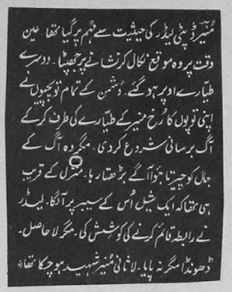
Major Munir Ahmad Sahib
Major Munir Ahmad Sahib was another Ahmadi who served in the Pakistani Army, and got martyred during the 1965 war. (Tarikh-e-Ahmadiyyat, Vol. 23, pp. 106-113)
Major Qazi Bashir Ahmad Sahib
Major Qazi Bashir Ahmad Sahib was an Ahmadi who served in the Pakistani Army. In 1950, he was posted as the Second Lieutenant at the Frontier Force Regiment. He was posted as the Company Commander, during the 1965 war, where he got martyred while fighting bravely. (Ibid, pp. 113-115)
Flying Officer Muhammad Shamsul Haq Sahib
Flying Officer Muhammad Shamsul Haq Sahib was born on 31 October 1947. During the 1971 war, he was stationed at the 14 Squadron in Dhaka. In appreciation of his heroic services during the war, he was awarded with Sitara-e-Jurrat (Star of Courage). Shaheen magazine of Pakistan Air Force also published his article titled “My War Experience” in its May-August 1972 issue. (Tarikh-e-Ahmadiyyat, Vol. 27, p. 108)
Lieutenant Mumtaz Anwar Sahib
Lieutenant Mumtaz Anwar Sahib was martyred during the 1971 war. For his heroic services, he was awarded with Sitara-e-Jurrat (Star of Courage). (Ibid, p. 104)
Lieutenant Mahmud Akhtar Zubairi Sahib
Lieutenant Mahmud Akhtar Zubairi Sahib was the son of Ihtiaj Ali Zubairi Sahib of Rawalpindi. He was martyred during the 1971 war. (Ibid, p. 105)
Brigadier Muhammad Mumtaz Khan Sahib
During the 1971 war, Brigadier Muhammad Mumtaz Khan Sahib was given the command of the Hussaini Wala Sector, which he bravely defended, and thus, he was awarded with Hilal-e-Jurrat (Crescent of Courage). (Ibid, pp. 109-110)
Major Afzaal Mahmood Sahib
Another Ahmadi, Major Afzaal Mahmood Sahib was martyred while fighting against the militants in Bajaur Agency, Khyber Pakhtunkhwa, on 19 June 2009, when he went on patrol with his men on the Pak-Afghan border. Near Bajaur, their convoy was attacked and he was shot in the head. On 20 June 2009, his body was brought to Rabwah and was buried with full army protocol.
Major General (retired) Nasir Chaudhry Sahib
Major General (retired) Nasir Chaudhry Sahib, was another Ahmadi who served in the Pakistani Army. He was martyred during the Lahore attacks of 28 May 2010.
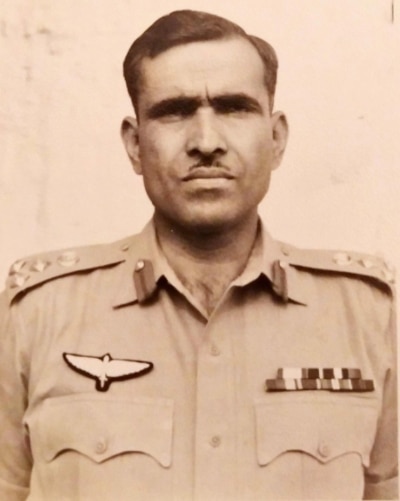
These were only a handful of examples. The reality is that Pakistani Ahmadis have always been at the forefront in serving their homeland.
The opponents of Ahmadiyyat can stop Pakistani Ahmadis from holding key positions, but they can never erase the stories of great milestones achieved by the Ahmadis of Pakistan.
The Ahmadis of Pakistan were, are and always will remain true defenders of Pakistan.


Perhaps I have misunderstood but I thought that Muslims were not given permission to fight wars of aggression and should only fight to secure freedom of religion. Is that correct and, if so, in what sense was this war with India a war to protect religious freedom?
It’s a pity that those who fought for the independence of Pakistan and even fought for it’s solidarity were being dented as non Muslims when their blood and sweat have been spread to save their homeland. What a twist of history that Ahmdis are denied their rightful positions in Pakistan and are even being persecuted for no other reasons than belonging to the party of the faithfuls.